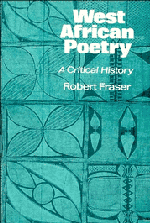Book contents
- Frontmatter
- Contents
- Acknowledgements
- West Africa: State borders and principal ethnic groupings
- Introduction
- 1 From oral to written verse: development or depletion?
- 2 Ladies and gentlemen
- 3 The négritude movement
- 4 Poetry and the university, 1957–63
- 5 The achievement of Christopher Okigbo
- 6 Continuity and adaptation in Ghanaian verse, 1952–71
- 7 Two Ijo poets
- 8 ‘Psalmody of sunsets’: The career of Lenrie Peters
- 9 The road to Idanre, 1959–67
- 10 The poet and war, 1966–70
- 11 The poetry of dissent, 1970–80
- 12 The return to orality
- A guide to availability
- Index
5 - The achievement of Christopher Okigbo
Published online by Cambridge University Press: 03 May 2011
- Frontmatter
- Contents
- Acknowledgements
- West Africa: State borders and principal ethnic groupings
- Introduction
- 1 From oral to written verse: development or depletion?
- 2 Ladies and gentlemen
- 3 The négritude movement
- 4 Poetry and the university, 1957–63
- 5 The achievement of Christopher Okigbo
- 6 Continuity and adaptation in Ghanaian verse, 1952–71
- 7 Two Ijo poets
- 8 ‘Psalmody of sunsets’: The career of Lenrie Peters
- 9 The road to Idanre, 1959–67
- 10 The poet and war, 1966–70
- 11 The poetry of dissent, 1970–80
- 12 The return to orality
- A guide to availability
- Index
Summary
When in 1967 the young Igbo poet Christopher Okigbo met his untimely death at the age of thirty-five on the battlefield of Nsukka during the Nigerian Civil War, he left behind him enough poetry to fill one slender volume. Yet this tiny offering, a mere seventy-two pages in length, arguably represents the most revered trophy in the gallery of English-language verse in Africa, and Okigbo himself the most talented of modern African poets. The verse of Labyrinths, as his collected works have come to be known, has a strange haunting quality, difficult to account for in orthodox critical language. It also triumphs over petty historical distinctions by refusing to lend itself to any one tradition, making a mockery of our painful efforts to allot it to any definable school or recognizable manner. It is the product of a deeply sophisticated mind, as steeped in the mythologies of Europe, Asia, and the ancient world as in the folklore of the rural Igbo amongst whom Okigbo grew up. Okigbo was a man of wide and voracious reading in the literatures of Greece and Rome which he read while a student of classics at the University College of Ibadan, in the poetry and legends of ancient Babylon, which he encountered in translation, and in the literatures of Europe and America, in which he retained a lively interest throughout his life. For him, to be a writer was to partake in an international community of letters.
- Type
- Chapter
- Information
- West African PoetryA Critical History, pp. 104 - 137Publisher: Cambridge University PressPrint publication year: 1986
- 2
- Cited by



